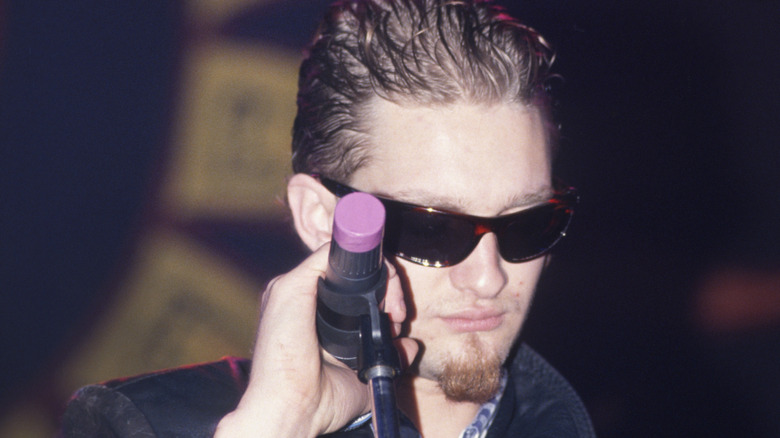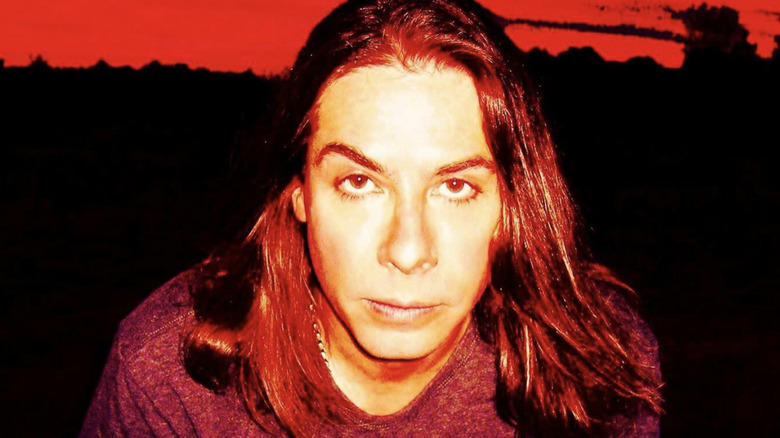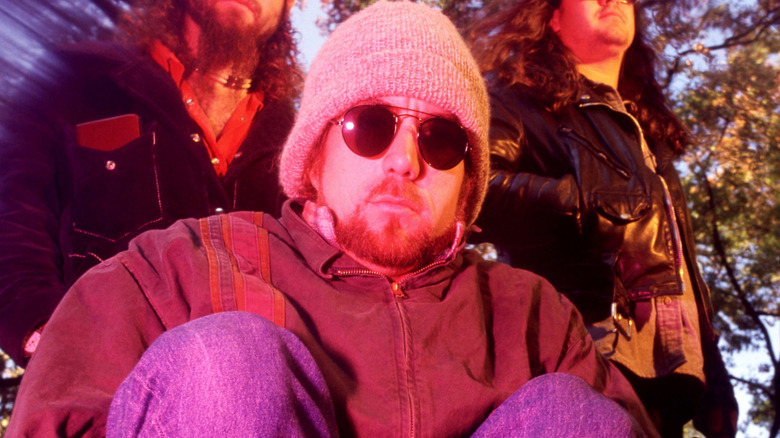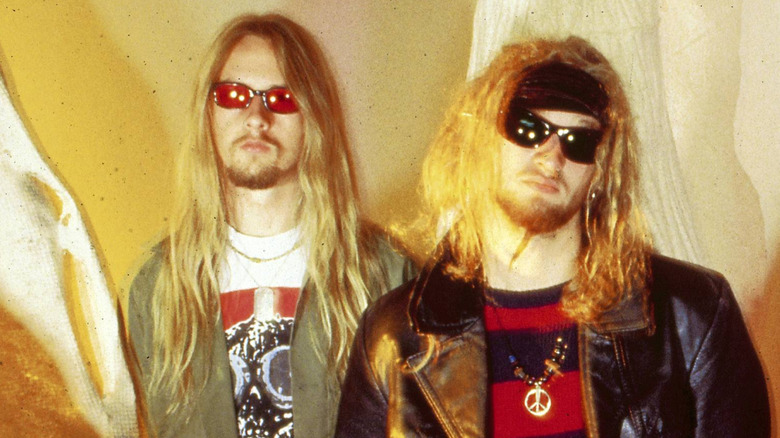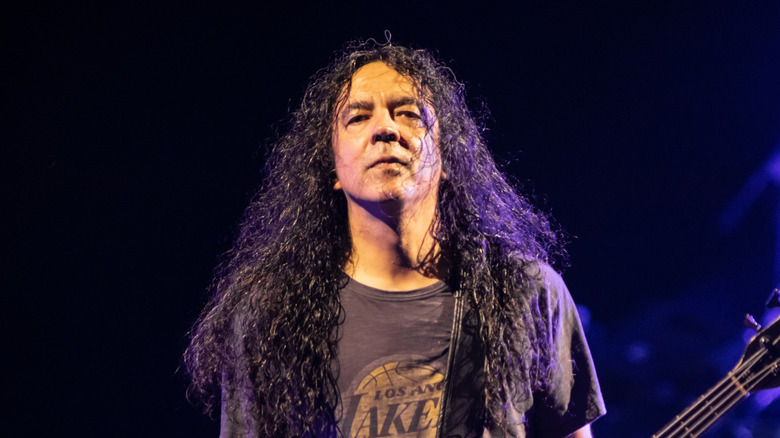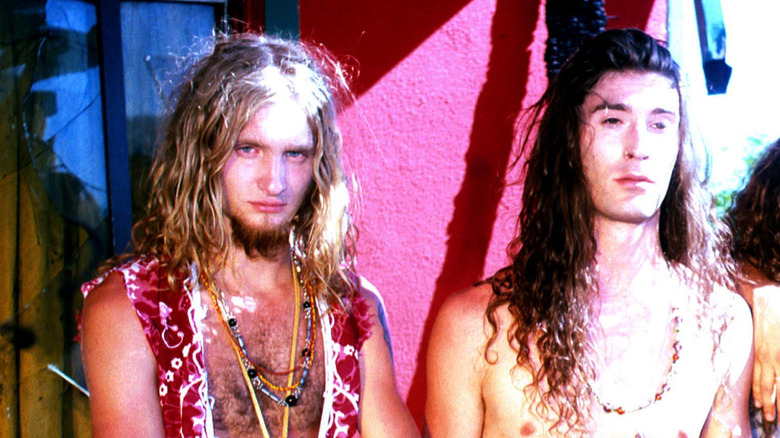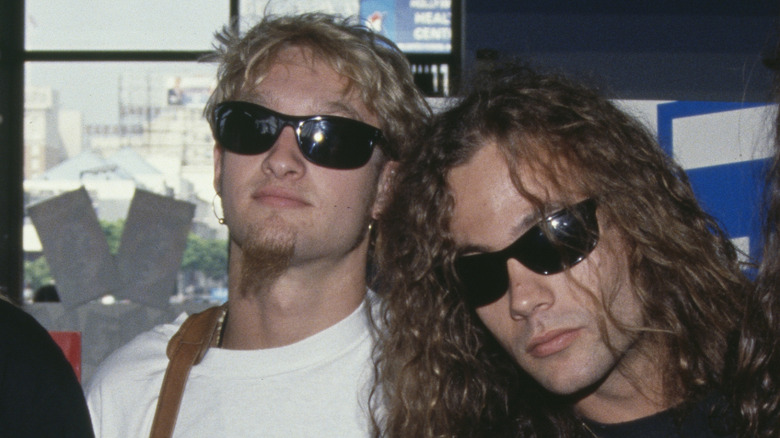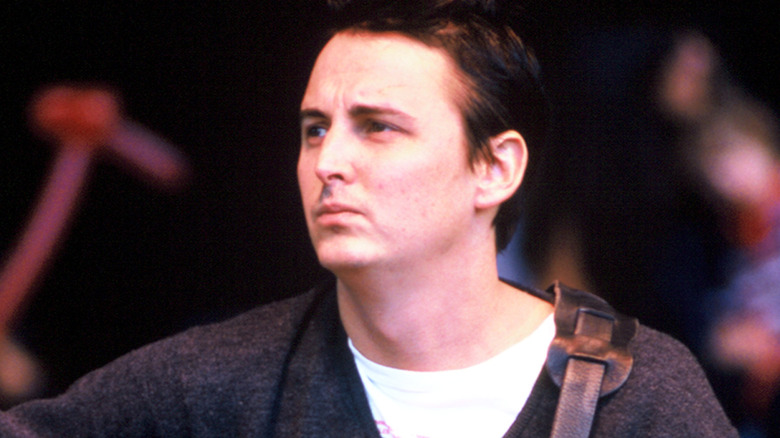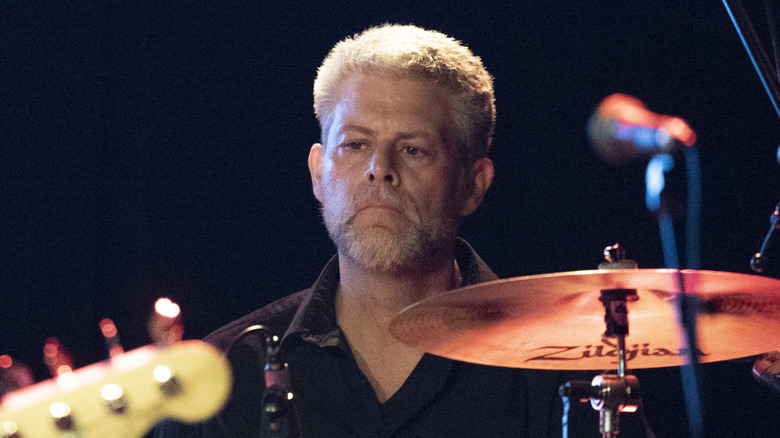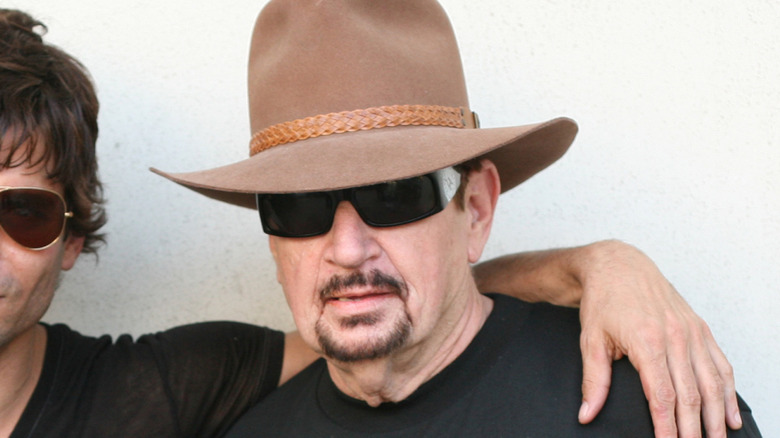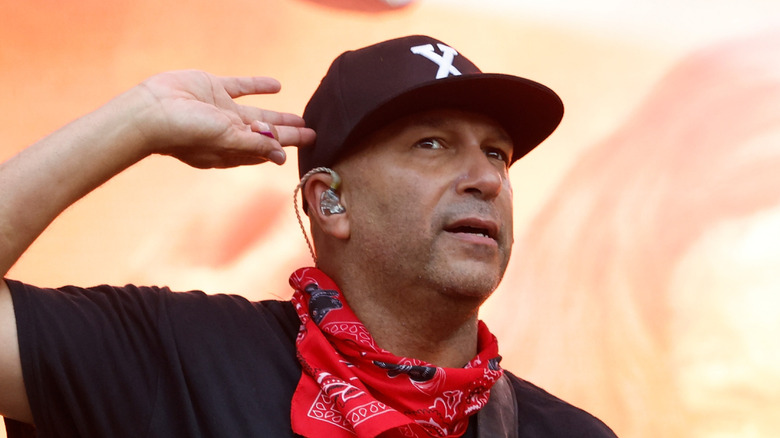Layne Staley's Former Bandmates Have A Lot To Say About Him
The real-life story of Alice in Chains is a tragic one, but also triumphant. Formed in Seattle in the 1980s, Alice in Chains set off and benefited from the early 1990s grunge music explosion. Alongside Nirvana's Kurt Cobain, Pearl Jam's Eddie Vedder, and Soundgarden's Chris Cornell, Alice in Chains' singer, occasional guitarist, and songwriter Layne Staley became a voice of his generation and a trendsetter in an evolving modern rock scene. Staley's lyrics were often dark, off-putting, and inscrutable, which led to the notion that the musician himself was all of those things as well, and all the time. Staley did deal with mental health and profound issues with addiction — he died of an overdose in 2002 in his apartment, which a tragic rock star autopsy revealed came several days before his remains were discovered.
His music was characterized as being rife with hopelessness, despair, and the nastiness of being a human. But if one consulted the people who knew Staley best, and at every stage of his adult life, a different portrait emerges. The musicians who played with and for Staley in Alice in Chains and his many side projects and other bands were usually dazzled by the singer-songwriter's kindness and innate artistic gifts. Layne Staley's many appreciative colleagues had a lot to say about the late, great Alice in Chains singer.
The following article mentions issues surrounding addiction and mental health.
Tim Branom
In the mid-1980s, Layne Staley joined a Seattle hard rock band that called itself Sleze, and later, Alice N' Chains. His bandmates included guitarist Scott Branom, whose brother, Tim Branom, was a musician, studio engineer, and producer, and they enlisted him to record a three-song demo. Before he could go through with that expensive proposition, he stepped in to be Staley's vocal coach, curating what natural talent was there to give it more sustainability, strength, and depth. At the time, Staley was innocent, curious, and focused. "I met him when he was 18. He was very non-judgmental and I never heard him say a bad word about anyone. He looked at life as a wave and just rode the wave – whatever came to him, he adapted and took the ride," Branom told Music Festival (via his own website) in 2018. "He didn't complain about things. He just did what he had to do to get good and took his music seriously."
Branom witnessed Staley's journey from neophyte to renowned rock star. "I think in the end of his life, fame was not what he envisioned," he said. "Maybe fame didn't give him happiness or maybe something else was troubling him. I never heard Layne speak a bad word about anyone. If there's anything we can learn, be kind to those that deserve it," Branom wrote on Facebook (via Metalwani).
Nick Pollock
By the time Sleze had transformed into Alice N' Chains, the lineup had solidified with a lineup that included Layne Staley on lead vocals and future My Sister's Machine member Nick Pollock on guitar. While both had been involved in the nascent Seattle music scene of the 1980s, they didn't become close until they landed the same day job and became drinking buddies. "Layne was totally cocky and ended up being my best friend really quick, and he and I were inseparable. We worked together at a place that made radiation-containment devices," Pollock related in Mark Yarm's "Everybody Loves Our Town." "He and I partied all the time. We would go to parties, we would make parties happen at people's houses."
After one such late-night gathering in West Seattle, Pollock and Staley went on a spree of minor vandalism, and police noticed. "The rest of us got away, but they were chasing Layne. Like I said, Layne was cocky, and he was a smart*** to the wrong cop, who actually sicced his dogs on him." Staley spent the night in prison; Pollock retrieved him in the morning.
Johnny Bacolas
In 1994, Alice in Chains was booked on a summer tour with Metallica and was scheduled to play the Woodstock '94 festival, but then Alice in Chains canceled all of its appearances. Unbeknownst to the public at the time, Alice in Chains had briefly broken up, owing in large part to Staley becoming an unreliable bandmate due to drug misuse.
During the Woodstock '94 weekend that Alice in Chains would've played, Staley went on a camping trip with two people, including Johnny Bacolas, a friend and bandmate in his pre-fame Seattle group, Alice N' Chains. His current-day bandmates tried to get ahold of Staley, but he couldn't answer their calls because he'd gone out into the wilds of eastern Washington with Bacolas to try to quit heroin. "It wasn't much fun for Layne at all. He slept a lot on that trip. We were tending to him to an extent," Bacolas recalled (via X, formerly known as Twitter).
Staley later suffered a lakeside emotional breakdown, likely triggered by withdrawals "I would always tell him, 'Layne, why don't you take off, go to some deserted island, hire the best counselors, and just kick this s***?'" Bacolas said in Greg Prato's "Grunge is Dead." "And his rebuttal was, 'Johnny, I have celebrity status and I have a lot of money. I could fly planes out to deliver me the dope if I wanted to — and that's what I would do. I can't escape.'"
Jerry Cantrell
Most of the music in Alice in Chains was written by Layne Staley and Jerry Cantrell. They forged a creative bond after becoming fast friends at a Seattle party in the late 1980s. After Cantrell's family threw him out of his home, Staley took him in, and after their respective bands Diamond Lie and Alice N' Chains broke up, they formed the brand new Alice in Chains.
Their partnership that powered Alice in Chains came naturally and organically. "Layne and I always considered each other a songwriting team without ever discussing it much. When he became interested in playing guitar, he started writing more, writing songs completely," Cantrell told Variety. "Of course, I supported that – a great artist and a good guy driven to make good music. We pushed each other." Still, Cantrell found Staley's talents to be utterly undeniable. "Layne to me is one of the greatest singers in rock and roll history, and I never heard anything like him before and I will never hear anything like him since," Cantrell said in a YouTube video in 2017. "Just to be able to get to be in a band with a guy that does that to you, there's nobody better to me than him, and he's my friend."
Mike Inez
After original bassist Mike Starr left Alice in Chains in 1993, Mike Inez departed Ozzy Osbourne's backing group to join the Seattle grunge act, which by that point was a superstar rock band. An active Alice in Chains with Layne Staley on the microphone would only last for about three more years, but Inez got to know his bandmate very well in that time, enough to defend him from rumors and negative media attention in the years after his death. "I've noticed when people die, it seems like the general public kind of romanticizes it. They look for a lot of extra stuff when just the 'real' was good enough. Layne was just a fantastic human," Inez told Revolver in 2013, also revealing that he was first and foremost a fan. "My two favorite singers are Freddie Mercury and Layne Staley. Everyone tried to duplicate them, but nobody could."
Inez spoke at length about what Staley was like to be around on a day-to-day basis. "He was such a bright light. He had just the bluest eyes. He lived for humor. The main thing for me was just his laugh. You could hear it all the way across the room, and there was just, like, realness to it," Inez recalled. "He'd never do any racist jokes. I never heard him talk s*** about anybody. He was always very supportive of other bands."
Sean Kinney
In talking up the release of a special 30th anniversary edition of Alice in Chains' seminal 1992 album, "Dirt," the group's longtime drummer Sean Kinney couldn't help but address the big issues discussed on the album. Layne Staley wrote and sang about what he knew, and in the case of "Dirt," that meant many songs about mental illness, loss, and especially the savage hold of drug addiction.
Kinney worried that making art about negativity may have cast Staley in a certain and somewhat inaccurate light. "'Dirt' was never a drug concept album," Kinney told Variety in 2022. "And Layne wasn't a d***. He wasn't tormented but instead witty, funny, and generous." After favorably comparing Staley's vocal talent to that of Ann Wilson of Heart, Kinney posited that his singer spoke for the entire band. "Layne was great at everything except for being a rock star. Doom and gloom may be a stigma," Kinney said. "Most of our music is about persevering and overcoming. But all of us had similar situations to Layne."
Mike Starr
Bassist Mike Starr left Alice in Chains in 1993, but he remained on good terms with Layne Staley. "Dear friend. Just a great person. What a great person he was," Starr told "Loveline" in 2010 of his ex-bandmate. On April 4, 2002, Starr marked his 36th birthday, and he wanted to celebrate the day hanging out with Staley. They remained in the singer's Seattle home, talking and watching TV. When they came across a show wherein a self-professed psychic claimed to help guests connect with their deceased relatives, Staley discussed how he'd had a supernatural experience of his own the night prior. "Demri was here last night. I don't give a f*** if you f***ing believe me or not, dude," Starr recalled Staley telling him, per David de Sola's "Alice in Chains: The Untold Story" (via Alternative Nation).
It seemed to Starr that Staley had been so affected by years of drug abuse that he was in need of emergency medical attention. "I was with him all that day on my birthday trying to keep him alive. I even asked him if I could call 911, and he said if I did he would never talk to me again. Of course I didn't know he was gonna die or I would've called 911 anyway," Starr recalled. The bassist believed that he was very likely the last person who saw Staley alive. According to the local medical examiner's office, Staley died the day after Starr's visit, on April 5, 2002.
Mike McCready
Mike McCready looms large in the history of Pearl Jam, among many other bands. After completing a stay in a drug rehabilitation center in Minnesota in 1994, the guitarist returned home to Seattle. Seeking a project to keep himself busy and to continue the recovery process, he formed Mad Season, recruiting other musicians coping with sobriety, including John Baker Saunders (whom he met in rehab) and Alice in Chains singer Layne Staley. Mad Season lasted for about six months and put out one album, and Saunders and Staley would both later die from drug overdoses, in 1999 and 2002, respectively.
Decades later, McCready was still mourning the deaths of his friends who were also briefly his bandmates. "I miss him a lot," McCready said of Staley to Seattle radio station 107.7 The End. "He was just a guy that struggled but he was a sweetheart ... and just couldn't get out of his addiction." McCready spoke highly of Staley and his kind demeanor. "Layne to me was a guy that never really bagged on anyone. He was a cool guy. I don't recall him ever making fun of people or being mean-spirited."
Barrett Martin
The fourth member of Mad Season, aside from John Baker Saunders, Mike McCready, and Layne Staley, was drummer Barrett Martin, a veteran of the hard rock band Skin Yard and who had enjoyed some early '90s success with Screaming Trees, a group with its own tragic backstory. It was McCready who floated the idea of handing vocal duties to Staley, a decision which Martin approved, particularly after the two became friends during their short time in Mad Season together.
It was long enough for the drummer to gain some insight into Staley's character, particularly how well-mannered and thoughtful he was. "Layne was an extremely intelligent, humorous, and gracious human being, and he cared about things like politeness and kindness to strangers, qualities that seem to be forgotten in today's narcissism culture," Martin told the "Layne Thomas Staley: A Legend Remembered" Facebook account. "He laughed easily and talked openly with his fans, and his guest list at shows was always reserved for the young, marginalized people who couldn't afford to buy a ticket. Those were Layne's people, the ones without a voice, and through the power of poetic language, Layne gave them a voice."
Dave Jerden
Early Alice in Chains got the sound that it wanted thanks to the consistent involvement of a producer. Dave Jerden produced and led the recording sessions for the band's first two full-length albums, 1990's "Facelift" and 1992's "Dirt." As important to the history and music of Alice in Chains as any full-time, full-fledged member, Jerden helped lead singer Layne Staley reach his potential as a vocalist while also witnessing firsthand his casual mastery of the voice and studio, using them as if they were musical instruments.
Those recordings bear such richly layered vocals because Layne Staley and main backing singer Jerry Cantrell captured their parts multiple times. "All vocals by Layne (lead and backgrounds) were tripled. All of Jerry's vocals were doubled. Layne was a master matching himself. And, most of the vocals were one or two takes," Jerden explained to Gearspace in 2022. "Layne would normally get a master take in the first or second track and then I would continue to try a few more takes to see if he would 'top' himself. He would give his all in every take."
Tom Morello
Before he retreated into a life of isolation in his Seattle home, where he died in 2002, Layne Staley contributed to what would be his last recording in 1998. He was selected to be the lead singer of a one-off supergroup called Class of '99, created to record a song for the 1999 darkly comic school-based horror movie "The Faculty." Class of '99 laid down a semi-ironic cover of Pink Floyd's anti-private school screed "Another Brick in the Wall (Pt. 2)." His collaborators on the rock radio hit were drummer Stephen Perkins of Jane's Addiction, bassist Martyn LeNoble of Porno for Pyros, and Tom Morello, guitarist for Rage Against the Machine, a band once banned from "Saturday Night Live".
Staley and Morello first became friendly back in the early 1990s, when Alice in Chains and Rage Against the Machine appeared on the same Lollapalooza tour together. After that, Staley began to play guitar more, which helped lead to a long-standing rumor that Morello had taught him how to play the instrument. "That is not true," Morello said in an online chat sponsored by The Guardian in 2018. "And I suspect he would not have been a good student." Morello went on to explain that they were just friends who loved rock, not a teacher and student. "Layne was a very smart, very funny person with a great, self-deprecating humor. We would often argue about which was more metal than the other, and I miss him a lot."
If you or anyone you know needs help with addiction issues and/or mental health, contact the relevant resources below:
-
The Substance Abuse and Mental Health Services Administration website or contact SAMHSA's National Helpline at 1-800-662-HELP (4357).
-
The Crisis Text Line by texting HOME to 741741, call the National Alliance on Mental Illness helpline at 1-800-950-NAMI (6264), or visit the National Institute of Mental Health website.
